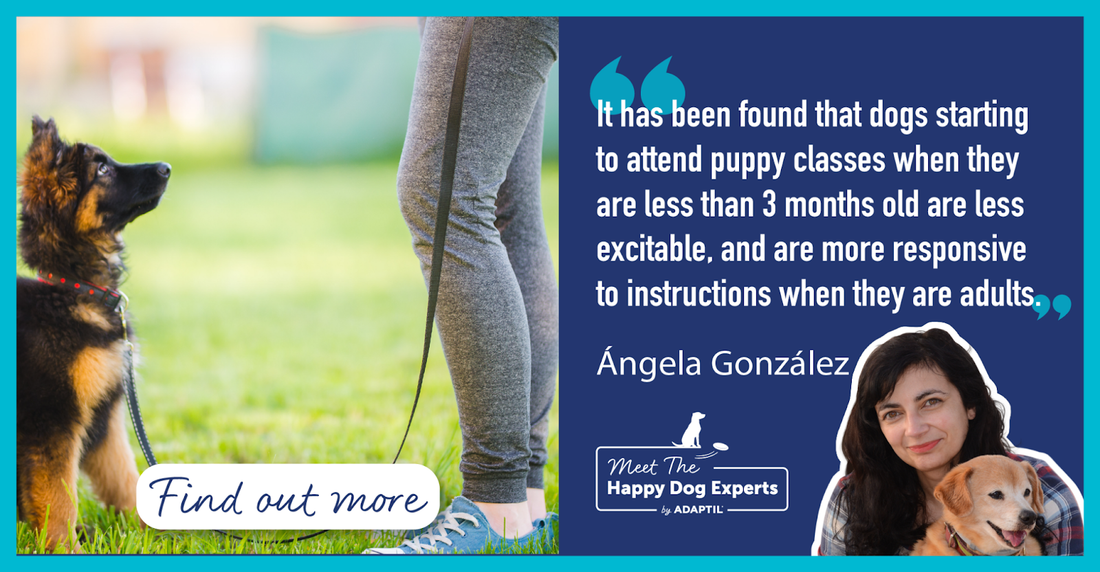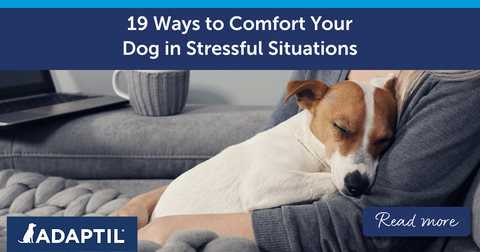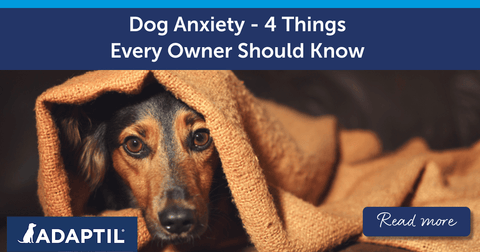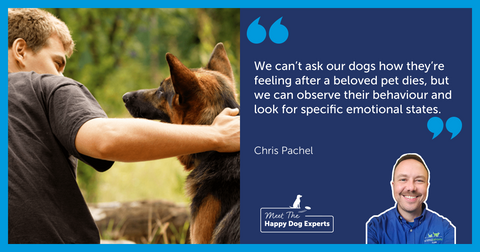Want to subscribe to our blog?

Happy Dog Expert: Reasons Why You Should Consider Puppy Training Classes
Written by Angela Gonzalez, published on April 18, 2023
At what age should my puppy go to puppy training?
The character and behaviour of a dog is influenced by both genetic and environmental factors, and there is a period of time when a puppy is especially sensitive to their environment. The socialisation period is a very sensitive phase in the development of a puppy that occurs from around 3 to 12 weeks of age, although it may vary depending on the breed or the individual.
It is during this period that the puppy's senses are sufficiently developed to allow them to explore their environment and begin to relate to other dogs and people that they are introduced to, developing the necessary social tools to be able to communicate with them, and to become familiar with different environments and objects that they will then consider normal in the future. Thus, a puppy that is not exposed to sufficient stimuli during its socialisation period can develop fear of new situations, unknown people and other dogs.
Learning through positive reinforcement
Another important environmental factor that greatly influences the behaviour and well-being of dogs is the method of education used. The use of "positive reinforcement" methods are recommended since they result in high learning rates, improve the dog-guardian link, promote a well-rounded character of the dog, avoid problems of coexistence, and ensure that training is enjoyable for both dog and owner.
Thus, combining proper socialisation with positive education helps puppies to be less likely to have behavioural problems when they grow up. Puppy classes are a series of sessions in which puppies have positive experiences with people and other dogs in a safe way. Alongside other puppies, they begin their education using positive methods; tutors will help puppy parents acquire knowledge about the behaviour and education of their puppies. Let's just say puppy classes are something similar to children's preschool. Check for puppy classes with your local dog professionals.
What might my puppy learn in puppy classes? Puppy classes include a theoretical and a practical programme which will vary between education centres. It is compulsory that puppies have fun in the classes!
Here are some elements a theoretical programme might cover:
- The socialisation period - why it is important and how to introduce your puppy gradually to different stimuli
- The importance of positive training
- Housetraining
- How to avoid future problems, such as spending time home along
- Dog communication and behaviour
- Health and hygiene topics
A practical programme is likely to cover these puppy training commands:
- Sit
- Lie down
- Stay
- Come
- Not pulling on leash
- Leave it/drop it
6 reasons to attend puppy classes
There are many benefits of attending puppy classes, which have been investigated by researchers. Here are some of the benefits of taking your pup to puppy classes:
1. Set your puppy up for learning
Puppies who go to puppy classes are easier to educate or train when they are adults. During puppy classes, puppy owners are instructed on the risks of using punitive methods and education is introduced in a positive way, so that the well-being of the dogs is always ensured and, in addition, the puppy-guardian bond is strengthened. It's important for your puppy to be able to learn and understand instructions while they are in a busy environment - surrounded by other dogs and people (which can be a distraction).
2. Teach your puppy not to get overexcited
It has been found that dogs starting to attend puppy classes when they are less than 3 months old are less excitable, and are more responsive to instructions when they are adults. A good puppy class will also help you to learn tools to control the excitability of your dog and some unwanted behaviours.
3. Decreased sensitivity to touch
Dogs that previously attended puppy classes have also been found to show less sensitivity when they are being handled. This can be very helpful for veterinary management, since these dogs are most likely easier to examine and manage when doing diagnostic tests and, in addition, will suffer less stress in the veterinary consultation.
4. Decreased fear of environmental stimuli
Dogs attending puppy classes have been seen to be less likely to show fear of environmental stimuli such as thunder, fireworks or traffic. This could be related to positive interactions that dogs have during the classes (with different stimuli and gradual exposure to them), recommendations given by tutors on how to socialise the puppies, and even the visit to the place where classes take place, which involves moderate exposure to external stimuli. It's important to keep in mind that environmental fear is very common in dogs, which makes the prevention of this even more important.
5. Improve your pup's bond with other dogs in the family
Interestingly, dogs that go to puppy classes show less aggression towards other family dogs than those who did not go to puppy classes. This could be due to the acquisition of better social skills at the puppy classes, thanks to controlled play between puppies, and advice given by tutors on canine social behaviour and avoiding the use of punishment.
6. Socialised dogs are less fearful
Puppy class attendance helps to properly socialise dogs; adult dogs that attended puppy classes are less likely to be afraid of unknown people than dogs that didn't receive this education. Since most aggression towards dogs and unknown persons is due to fear, attending puppy classes can also decrease the likelihood of dogs showing aggression in these situations.
Staying healthy
During the socialisation period, puppies are still receiving their first vaccinations so they are more susceptible to infectious diseases. However, puppy classes will have protocols for vaccinations and parasite control required before your puppy joins the class. This allows puppies to benefit from this important education but in a protected environment. As an example, it has been shown that puppies attending puppy classes are not more likely to contract parvovirus (one of the diseases puppies are vaccinated against) than puppies that do not attend classes.
What about teenage dogs?
Although the socialisation period ranges from 3 weeks to 3 months of age, positive contact with people and dogs after this period is also effective and beneficial. In a study conducted in Spain, classes were held for both puppies and juvenile dogs (older than three months) and positive effects were shown for both groups. Thus, classes for juvenile dogs are useful to continue the education and socialisation that they start in puppy classes. Even if your dog hasn't been to puppy classes, it's still recommended to take your adolescent dog to training classes.
In conclusion, puppy classes are a useful way to assist your puppy's early learning with benefits including the prevention of certain behavioural problems, especially those related to fear and aggression, assisting future healthcare needs, and deepening the bond you have with your puppy. You might learn a lot yourself following these classes. Are you ready for your puppy to start school?
Bibliography
- González-Martínez Á, Martínez MF, Rosado B, et al. Association between puppy classes and adulthood behavior of the dog. J Vet Behav. 2019;32. doi:10.1016/j.jveb.2019.04.011
- Kutsumi A, Nagasawa M, Ohta M, Ohtani N. Importance of puppy training for future behavior of the dog. J Vet Med Sci. 2013;75(2):141-149. doi:10.1292/jvms.12-0008.
- Seksel K, Mazurski EJ, Taylor A. Puppy socialisation programs: Short and long term behavioural effects. Appl Anim Behav Sci. 1999;62(4):335-349. doi:10.1016/S0168-1591(98)00232-9
- Stepita ME, Bain MJ, Kass PH. Frequency of CPV Infection in Vaccinated Puppies that Attended Puppy Socialization Classes. Am Anim Hosp Assoc. 2013;49(2):95-100. doi:10.5326/JAAHA-MS-5825
Following our expert tips will help to ensure your bond with your dog goes from strength to strength.
Make sure to join our community for weekly advice from our dog behaviour experts as well as product offers and competitions.
 Related Posts
Related Posts
Legal notice The information collected is intended for Ceva Santé Animale and the group in order to manage your requests. This information can be shared with service providers in order to organize their management. In accordance with the General Data Protection Regulations, you have the right to access, rectify and limit the processing of your data. You can also, in certain cases, object to the processing, withdraw your consent and request the deletion and portability of your data. For any request in relation to your personal data, please visit this page.



































